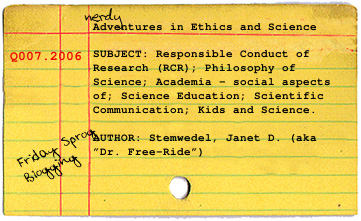In a post about curricular issues in genetics and biochemistry courses, Larry Moran raises some good questions:
It’s almost a requirement these days that introductory genetics courses include a section on genetically modified crops. This invariably leads to tutorials, or labs, or essays, about whether GM-foods are a good thing or not. These discussions are usually lots of fun and the students enjoy this part of the course. Professors are convinced they are teaching ethics and that it’s a good thing to show students that ethics is an important part of science.
In introductory biochemistry courses we often have a section on fuel metabolism. That’s the part of biochemistry that deals specifically with how your food is converted to energy. It’s human biochemistry. In that section of the course the Professor often raises the question of proper diet. Is it okay to eat meat? Are trans fatty acids bad for you? Should you be eating carbohydrates? Our experience is that Professors who teach this section often have very strong opinions and their personal ethical stance is portrayed as scientific fact.
These are two different cases. In the first one, the question is whether the value of debating controversial “ethical” issues outweighs the disadvantages. The biggest downside, in my opinion, is the emphasis on technology as opposed to pure basic science. By giving prominence to “ethical” issues we are emphasizing the consequences of genetic knowledge as it relates to the human condition. …
Part of the problem arises from a desire to please the students. How often do we hear the complaint that students aren’t interested in biochemistry and genetics? The students are bored by science so we have to add sections on genetically modified foods and genetic screening to our introductory genetics courses. Isn’t this strange? Rather than concentrate on making the basic science as interesting and exciting as possible, we cater to the students by giving them the topics they think are interesting. That’s no way to educate.
There’s another problem; what is ethics? Sometimes it’s hard to see the difference between simple controversy and ethics. Sometimes it’s hard to define exactly what “ethics” is all about in spite of the fact that “bioethics” is one of the biggest growth industries in science. Here’s where a philosopher or two could weigh in.
Hey, I’m a philosopher! Here’s my take:


